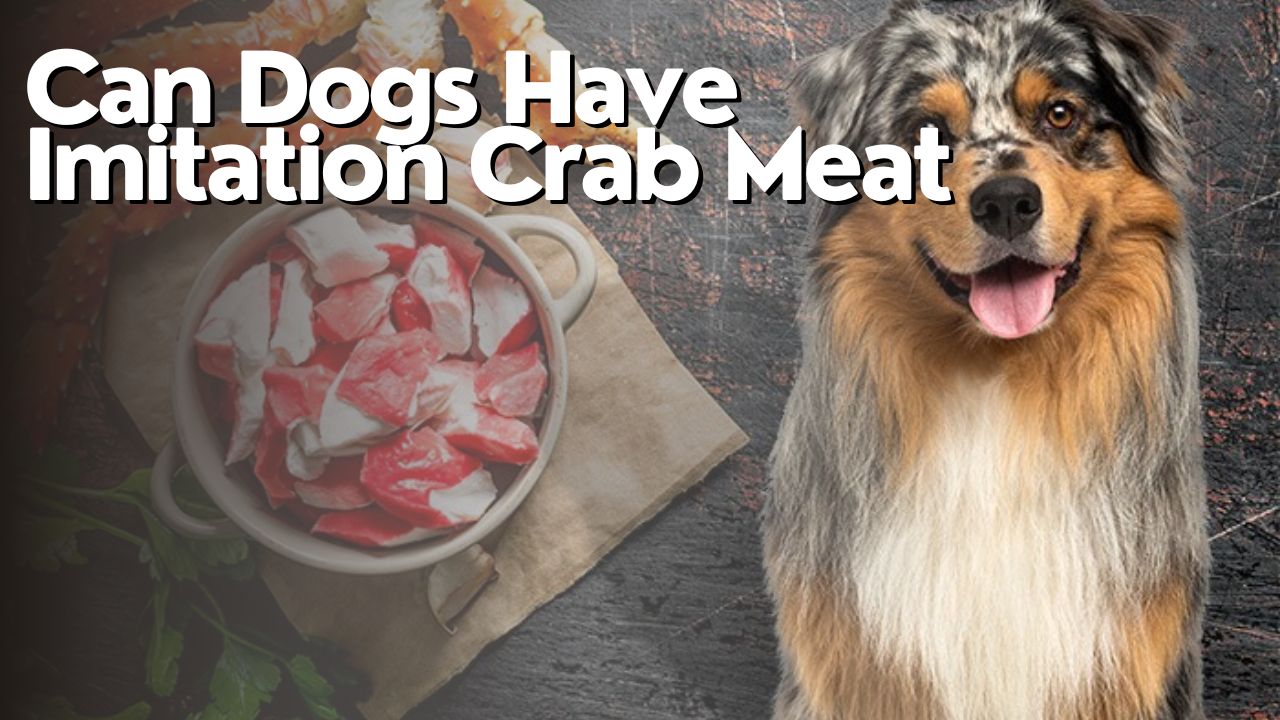Hey there! So, I recently found myself wondering if dogs can have imitation crab meat. I mean, it’s a popular seafood option for us humans, but what about our furry friends? That’s why I decided to dive into the topic and gather some information to share with you.
In this article, we’ll explore the ingredients of imitation crab meat, the potential risks it may pose to dogs, and the benefits of feeding seafood to our canine companions. Of course, we’ll also discuss some important considerations to keep in mind if you’re thinking about giving your dog imitation crab meat.
And don’t worry, I’ll provide you with alternative safe seafood options for your pup as well. So, let’s get started and find out if imitation crab meat is a yay or a nay for our four-legged buddies!
Understand the Ingredients of Imitation Crab Meat
You might be surprised to learn that imitation crab meat is made from a combination of white fish, starch, and flavorings, which gives it the unique taste and texture that dogs may find appealing. While it may seem like a suitable treat for your furry friend, it’s important to understand the ingredients and potential risks before sharing it with them.
The main component of imitation crab meat is white fish, typically Alaskan pollock, which is minced and formed into a shape resembling crab legs or flakes. Starch, usually derived from wheat or corn, is added to bind the fish together and give it a firmer texture. Additionally, various flavorings such as sugar, salt, and crab extract are included to enhance the taste and mimic the flavor of real crab.
However, it’s crucial to note that imitation crab meat often contains artificial additives, preservatives, and high levels of sodium. These additives can be harmful to dogs and may cause digestive issues, such as vomiting or diarrhea. Moreover, the high sodium content can lead to dehydration and kidney problems in dogs, especially those with pre-existing health conditions.
Therefore, while dogs may find the taste and texture of imitation crab meat appealing, it is best to avoid feeding it to them. Stick to dog-friendly treats that are specifically formulated to meet their nutritional needs and don’t contain any potentially harmful ingredients. Your furry friend’s health and well-being should always be the top priority.

Potential Risks of Feeding Imitation Crab Meat to Dogs
Feeding your furry friend imitation crab meat can pose certain health risks. While dogs may enjoy the taste of this seafood substitute, it’s important to understand the potential dangers it can bring.
One major concern is the high sodium content in imitation crab meat. Dogs have different sodium requirements than humans, and excessive salt intake can lead to health problems such as dehydration, kidney damage, and heart issues. Additionally, some imitation crab products contain additives and preservatives that can be harmful to dogs. These additives, like artificial flavors and colors, may cause digestive issues or allergic reactions.
To provide a clearer picture, here’s a table comparing the nutritional content of imitation crab meat and real crab meat:
| Nutrients | Imitation Crab Meat | Real Crab Meat |
|---|---|---|
| Protein | Lower | Higher |
| Omega-3 Fatty Acids | None | Present |
| Sodium | Higher | Lower |
| Vitamins | Lower | Higher |
As you can see, real crab meat offers more nutritional benefits for your dog compared to imitation crab meat. It’s always best to consult with your veterinarian before introducing any new food into your dog’s diet. They can provide guidance on suitable alternatives and help ensure your furry friend stays healthy and happy.
Benefits of Feeding Seafood to Dogs
Indulging your furry companion with seafood can provide them with a range of health benefits. Seafood, including crab meat, is packed with nutrients that can support your dog’s overall well-being. Here are some of the benefits of feeding seafood to dogs:
- Omega-3 fatty acids: Seafood is a great source of omega-3 fatty acids, which are essential for promoting a healthy coat and skin. These fatty acids also support brain function and can help reduce inflammation in the body.
- Protein: Seafood, like imitation crab meat, is rich in protein, which is important for muscle development and repair. Protein also helps to boost the immune system and maintain a healthy weight.
- Vitamins and minerals: Seafood contains various vitamins and minerals, such as vitamin D, vitamin B12, and zinc, which play a vital role in your dog’s overall health. These nutrients support bone health, nerve function, and energy production.
- Joint health: Some seafood, like crab meat, contains natural compounds that can help support joint health in dogs. This is particularly beneficial for older dogs or those with arthritis.
- Taste and variety: Seafood provides a delicious and different flavor for your dog, adding variety to their diet and making mealtime more enjoyable.
Remember to introduce seafood gradually and in moderation, and always consult with your veterinarian before making any significant changes to your dog’s diet.
Considerations for Feeding Imitation Crab Meat to Dogs
When it comes to feeding imitation crab meat to dogs, there are a few important considerations to keep in mind.
Firstly, moderation and portion control are key to ensure that your dog is not consuming too much sodium or other potentially harmful ingredients.
Secondly, the cooking methods and seasonings used with imitation crab meat can also impact its suitability for dogs, so it’s important to be mindful of what is being added.
Lastly, consulting with a veterinarian is always a good idea, as they can provide guidance specific to your dog’s individual needs and health conditions.

Moderation and Portion Control
To maintain a healthy diet for your furry friend, it’s important to remember that portion control and moderation are key when offering them imitation crab meat. Dogs can technically have imitation crab meat, but it should only be given to them occasionally and in small amounts. Imitation crab meat is typically high in sodium and may contain additives that can be harmful to dogs if consumed in large quantities. It’s best to treat it as a special treat rather than a regular part of their diet.
When giving your dog imitation crab meat, make sure to remove any shells or bones and cut it into small, manageable pieces. Always consult with your veterinarian before introducing any new foods into your dog’s diet to ensure it’s safe for them to consume.
Cooking Methods and Seasonings
For a more flavorful and nutritious meal, I can try different cooking methods and seasonings with my furry friend’s crab alternative. Cooking methods such as boiling, baking, or steaming can help retain the natural flavors of the imitation crab meat. Seasonings like garlic, parsley, or a dash of lemon juice can add a burst of freshness and enhance the taste. However, it’s important to remember that some seasonings, like onion or garlic powder, can be harmful to dogs in large amounts. Therefore, moderation is key. To help you understand which seasonings are safe for your dog, here is a table that outlines some common seasonings and their potential effects on dogs:
| Seasoning | Potential Effects on Dogs |
|---|---|
| Garlic | Toxic in large amounts |
| Parsley | Freshens breath |
| Lemon juice | Adds a tangy flavor |
| Onion powder | Toxic in large amounts |
| Salt | Moderation is key |
Keep in mind that every dog is different, and it’s always best to consult with your veterinarian before introducing new seasonings into your dog’s diet.
Consulting with a Veterinarian
After learning about different cooking methods and seasonings for dogs, it’s important to consult with a veterinarian before introducing imitation crab meat into their diet.
As a dog owner, I understand the desire to share tasty treats with our furry friends, but it’s crucial to prioritize their health and well-being. A veterinarian can provide expert advice tailored to your dog’s specific needs, ensuring they receive proper nutrition and avoid any potential risks.
By consulting with a professional, you can gain valuable insights about the potential effects of imitation crab meat on your dog’s digestive system and overall health. Remember, our dogs rely on us to make informed decisions on their behalf.
So, before treating your furry companion to imitation crab meat, consult with a trusted veterinarian who can offer guidance and support.
Proper nutrition for dogs is essential for their overall health and well-being.
Consulting with a veterinarian ensures your dog’s dietary needs are met.
Expert advice can help you make informed decisions about your dog’s diet.
Alternative Safe Seafood Options for Dogs
Looking for safe seafood options for your furry friend? While imitation crab meat may not be the best choice for dogs, there are plenty of alternative options that are safe and healthy for them to enjoy. Seafood can provide dogs with essential nutrients like omega-3 fatty acids, which are great for their skin and coat health.
Here are some alternative safe seafood options for dogs:
| Seafood | Benefits |
|---|---|
| Salmon | Rich in omega-3 fatty acids, protein, and vitamin D |
| Shrimp | High in protein and low in fat |
| Tuna | Great source of lean protein and omega-3 fatty acids |
| Sardines | Packed with omega-3 fatty acids, calcium, and vitamin D |
| Mackerel | High in omega-3 fatty acids and vitamin B12 |
| Cod | Low in fat and a good source of vitamin B12 |
| Trout | Contains omega-3 fatty acids and vitamin D |
When introducing seafood to your dog’s diet, it’s important to cook it thoroughly and remove any bones or skin. Also, remember to serve seafood in moderation and consult with your veterinarian to ensure it fits well with your dog’s overall diet and health needs.
By offering these safe and nutritious seafood options, you can treat your dog to a tasty and healthy addition to their meals.
Frequently Asked Questions
Can dogs eat real crab meat?
Yes, dogs can eat real crab meat. It is safe and can be a good source of protein for them. However, always make sure to remove any shells or seasoning before feeding it to your furry friend.
Is imitation crab meat safe for humans to consume?
Imitation crab meat is generally safe for humans to consume. However, it is important to note that it is made from processed fish and other ingredients, so it may not have the same nutritional value as real crab meat.
What are the common ingredients found in imitation crab meat?
The common ingredients found in imitation crab meat include fish, starch, sugar, egg whites, and flavorings. However, it’s important to note that dogs should not consume imitation crab meat as it may contain additives or ingredients that can be harmful to them.
Are there any potential allergic reactions that dogs can have to imitation crab meat?
Yes, dogs can have potential allergic reactions to imitation crab meat. It’s important to be cautious as some dogs may be allergic to certain ingredients found in imitation crab meat, such as wheat or soy.
Can dogs develop any long-term health issues from consuming imitation crab meat?
Dogs can develop long-term health issues from consuming imitation crab meat. Some potential problems include digestive issues, allergic reactions, and nutritional imbalances. It’s best to consult with a veterinarian before feeding it to your dog.
Conclusion
In conclusion, I wouldn’t recommend feeding imitation crab meat to dogs. It may be tempting to share this seafood treat with our furry friends, but it’s important to consider the potential risks involved. Imitation crab meat has artificial ingredients and high sodium levels, which can harm dogs. Instead, choose safe seafood options like cooked fish or shrimp that provide beneficial nutrients without the added risks. Always consult with a veterinarian before introducing new foods into your dog’s diet.


